This comprehensive article will delve into the properties, health benefits, and importance of zinc, an essential trace element in the human body. The article will discuss the different roles zinc plays in various physiological processes, its impact on the immune system, and how it contributes to overall health and wellbeing.
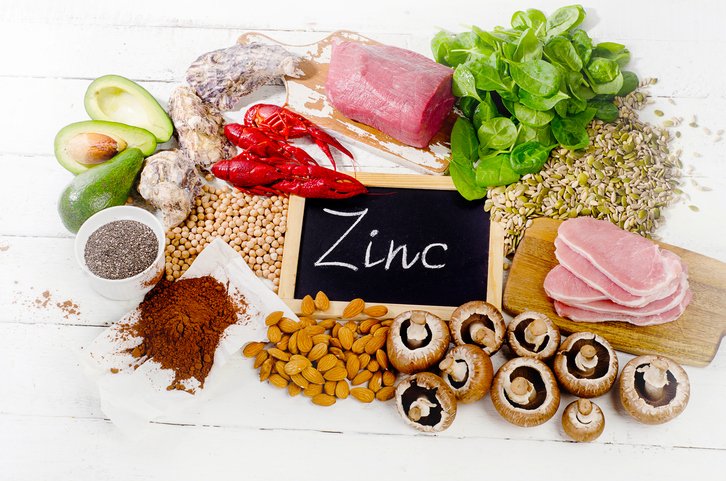
1. Introduction
In this section, we will introduce the importance of zinc, a crucial trace element, in human health and provide an overview of its various roles in maintaining physiological processes.
1.1. Background on Zinc
Zinc is an essential trace element, meaning that it is required in small amounts for the proper functioning of the human body. It is the second most abundant trace element in the body, after iron, and is present in every cell. As a divalent cation (Zn2+), zinc participates in numerous physiological processes, including enzyme catalysis, cell signaling, and structural stability of proteins.
1.2. The Importance of Zinc in Human Health
Zinc plays a vital role in numerous aspects of human health. It is involved in maintaining the immune system, wound healing, DNA synthesis, protein synthesis, cell division, and growth and development. Due to its wide-ranging effects on various physiological processes, a sufficient intake of zinc is crucial for maintaining overall health and preventing various diseases and conditions associated with zinc deficiency. In this article, we will delve into the specific roles of zinc in different physiological processes and explore its health benefits in greater detail.
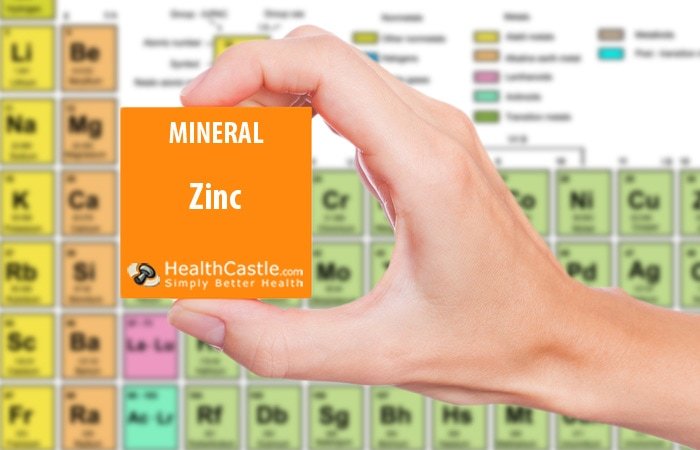
2. The Biochemistry of Zinc
In this section, we will discuss the biochemistry of zinc, focusing on its homeostasis, binding proteins, and cellular uptake and efflux mechanisms.
2.1. Zinc Homeostasis
Zinc homeostasis refers to the delicate balance of zinc levels in the body, ensuring that there is neither a deficiency nor an excess of this trace element. To achieve this balance, the body relies on a complex network of transporters, binding proteins, and regulatory mechanisms. Zinc homeostasis is maintained through the concerted action of three primary systems: intestinal absorption, cellular uptake and efflux, and the regulation of zinc storage and release by zinc-binding proteins.
2.2. Zinc Binding Proteins
Zinc-binding proteins play a crucial role in regulating the bioavailability of zinc and maintaining zinc homeostasis. These proteins include metallothioneins, which are small, cysteine-rich proteins that can bind multiple zinc ions, and various zinc transporters that facilitate the movement of zinc across cellular membranes. Metallothioneins help to buffer intracellular zinc levels, while zinc transporters regulate the influx and efflux of zinc ions into and out of cells.
2.3. Cellular Uptake and Efflux
Zinc transporters are essential for the proper distribution of zinc within the body. Two main families of zinc transporters are responsible for cellular uptake and efflux: the Zrt/Irt-like Protein (ZIP) family and the ZnT (SLC30A) family. ZIP transporters facilitate the influx of zinc ions into the cytoplasm, while ZnT transporters are responsible for the efflux of zinc ions from the cytoplasm or their sequestration within intracellular organelles. The concerted action of these transporters ensures that zinc levels are tightly regulated within cells and across tissues, maintaining zinc homeostasis and preventing zinc-related health issues.
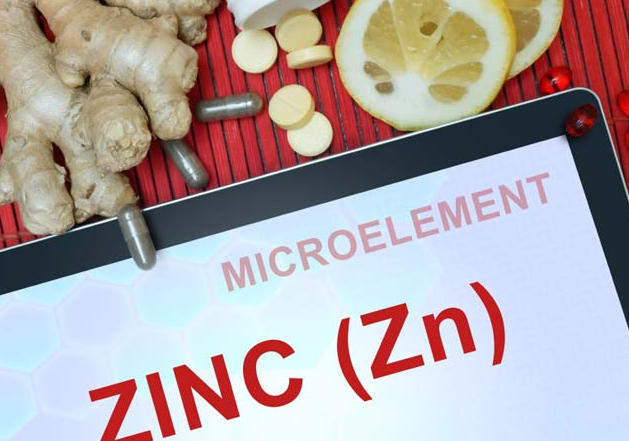
3. Dietary Sources and Recommended Intake
In this section, we will discuss the dietary sources of zinc, the role of supplements, and the recommended daily allowance for different age groups and populations.
3.1. Zinc-Rich Foods
Zinc is naturally present in a variety of foods, and its bioavailability can be influenced by dietary factors. Some of the best dietary sources of zinc include oysters, red meat (such as beef and lamb), poultry, seafood (particularly crab and lobster), legumes (like chickpeas, lentils, and beans), nuts and seeds (such as pumpkin seeds, cashews, and almonds), whole grains, dairy products, and fortified breakfast cereals. Fruits and vegetables generally contain lower amounts of zinc.
3.2. Dietary Supplements
Zinc supplements are available in various forms, including capsules, tablets, and lozenges. They can be particularly beneficial for individuals who have difficulty obtaining adequate zinc from their diet or those with increased zinc requirements, such as pregnant or lactating women, athletes, or individuals with certain medical conditions. However, it is important to consult a healthcare professional before starting any supplementation, as excessive zinc intake can lead to toxicity and interfere with the absorption of other essential nutrients.
3.3. Recommended Daily Allowance
The Recommended Dietary Allowance (RDA) for zinc varies by age, sex, and life stage. The RDA represents the average daily intake level that is sufficient to meet the nutrient requirements of most healthy individuals. Some examples of RDAs for zinc are as follows:
Infants (0-6 months): 2 mg/day
Children (1-8 years): 3-5 mg/day
Adolescents (9-18 years): 8-11 mg/day
Adults (19+ years): 8-11 mg/day
Pregnant women: 11-13 mg/day
Lactating women: 12-14 mg/day
These values are guidelines and may need to be adjusted based on individual needs and circumstances, such as the presence of medical conditions or specific dietary restrictions. It is essential to consult a healthcare professional for personalized recommendations.
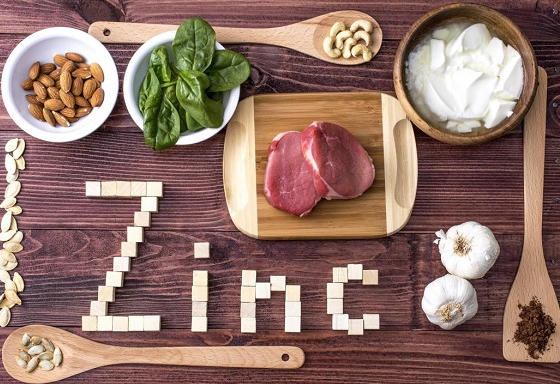
4. Zinc and the Immune System
In this section, we will explore the critical role of zinc in the immune system, its antiviral and antibacterial properties, and its involvement in inflammation regulation.
4.1. Zinc’s Role in Immune Cell Function
Zinc is essential for the proper functioning of various immune cells, including T cells, B cells, natural killer (NK) cells, and macrophages. It plays a critical role in the development, differentiation, and activation of these cells. Zinc is involved in the production of cytokines, which are signaling molecules that modulate immune cell function, and it helps maintain the integrity of immune cell membranes. Moreover, zinc is required for the optimal activity of numerous enzymes in the immune system, such as superoxide dismutase and various protein kinases.
4.2. Antiviral and Antibacterial Properties
Zinc possesses antiviral and antibacterial properties, contributing to the body’s defense against infections. It can inhibit the replication of several viruses, including the common cold virus (rhinovirus), by interfering with viral entry, genome transcription, and protein synthesis. Zinc also exhibits antibacterial activity, particularly against Gram-positive bacteria, by disrupting bacterial membrane integrity and interfering with bacterial metabolism. Additionally, zinc can modulate the host’s immune response to prevent excessive inflammation and tissue damage during infections.
4.3. Zinc and Inflammation
Zinc plays a crucial role in regulating inflammation, which is a key component of the immune response. It acts as a modulator of the production and release of pro-inflammatory cytokines, such as tumor necrosis factor-alpha (TNF-α) and interleukin-6 (IL-6), and it can inhibit the activation of nuclear factor-kappa B (NF-κB), a transcription factor involved in inflammatory responses. By controlling the levels of these molecules, zinc helps maintain a balanced immune response and prevents excessive or chronic inflammation, which can be detrimental to overall health.
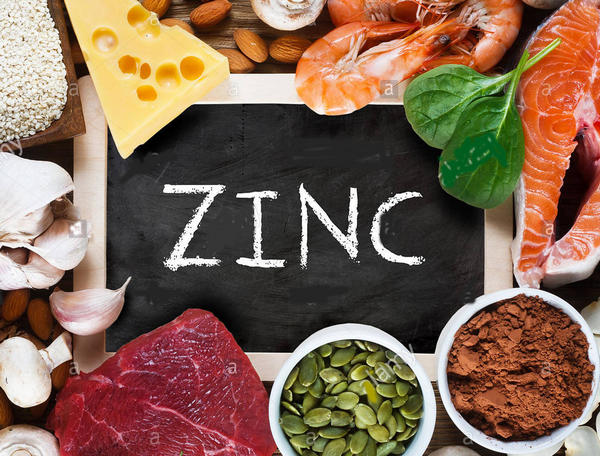
5. Zinc and Metabolic Function
In this section, we will discuss the essential roles of zinc in enzyme function, DNA and RNA synthesis, and cellular signaling and regulation.
5.1. Role in Enzyme Function
Zinc is a crucial cofactor for over 300 enzymes involved in a wide range of metabolic processes, including digestion, energy production, and antioxidant defense. It is necessary for the activity of various enzymes, such as alcohol dehydrogenase (involved in alcohol metabolism), carbonic anhydrase (involved in acid-base balance), and matrix metalloproteinases (involved in tissue remodeling). By participating in the catalytic, structural, or regulatory functions of these enzymes, zinc plays a critical role in maintaining cellular metabolism and overall health.
5.2. DNA and RNA Synthesis
Zinc is essential for the synthesis of DNA and RNA, the genetic material that carries the instructions for protein synthesis and cellular function. It is a cofactor for several enzymes involved in DNA replication, transcription, and repair, including DNA polymerase, RNA polymerase, and reverse transcriptase. Zinc also plays a role in the regulation of gene expression, as it is a component of zinc finger proteins, which are transcription factors that bind to specific DNA sequences and modulate the expression of target genes.
5.3. Cellular Signaling and Regulation
Zinc is involved in various cellular signaling pathways and regulatory processes, such as cell proliferation, differentiation, and apoptosis (programmed cell death). It can modulate the activity of several signaling molecules, including protein kinases, phosphatases, and transcription factors. Zinc also participates in redox signaling, as it can act as an antioxidant and protect cells from damage caused by reactive oxygen species (ROS). Furthermore, zinc can regulate the activity of ion channels and neurotransmitter receptors, thereby influencing neuronal excitability and synaptic transmission. Overall, zinc plays a vital role in maintaining cellular homeostasis and ensuring the proper functioning of various physiological processes.
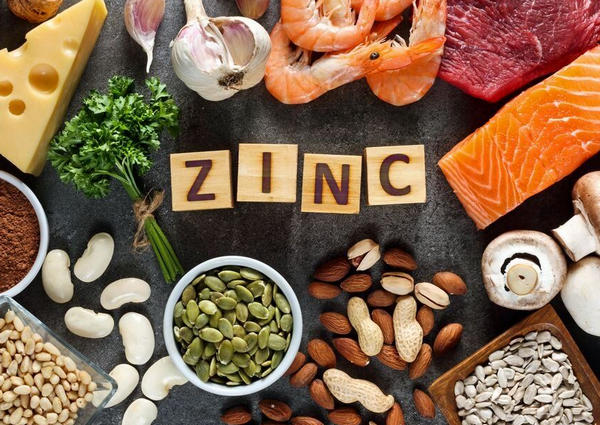
6. Zinc and Growth and Development
In this section, we will explore the essential roles of zinc in prenatal and postnatal growth, skeletal development, and cognitive development and neurological functions.
6.1. Prenatal and Postnatal Growth
Zinc is crucial for normal growth and development during prenatal and postnatal stages. It is involved in cell division, differentiation, and migration, which are essential processes for embryonic and fetal growth. Inadequate zinc intake during pregnancy can lead to growth retardation, congenital abnormalities, and preterm delivery. Similarly, postnatal zinc deficiency can result in impaired growth, delayed sexual maturation, and increased susceptibility to infections in children and adolescents.
6.2. Zinc’s Role in Skeletal Development
Zinc is essential for maintaining the health and integrity of bones. It is involved in bone formation, mineralization, and remodeling, as well as the regulation of bone turnover. Zinc acts as a cofactor for several enzymes involved in bone metabolism, including alkaline phosphatase, which plays a role in bone mineralization. Additionally, zinc can modulate the activity of osteoblasts (bone-forming cells) and osteoclasts (bone-resorbing cells), thus influencing bone mass and strength. Zinc deficiency can lead to reduced bone mineral density, increased risk of fractures, and the development of skeletal abnormalities.
6.3. Cognitive Development and Neurological Functions
Zinc plays a critical role in cognitive development and the maintenance of neurological functions. It is involved in the formation and plasticity of synapses, the communication points between neurons, and the modulation of neurotransmitter systems, such as glutamate and GABA. Zinc is also crucial for learning and memory processes, as it can regulate the activity of several signaling pathways and transcription factors involved in synaptic plasticity and long-term potentiation. Zinc deficiency has been linked to impaired cognitive development, learning disabilities, and an increased risk of neurodegenerative diseases, such as Alzheimer’s disease.
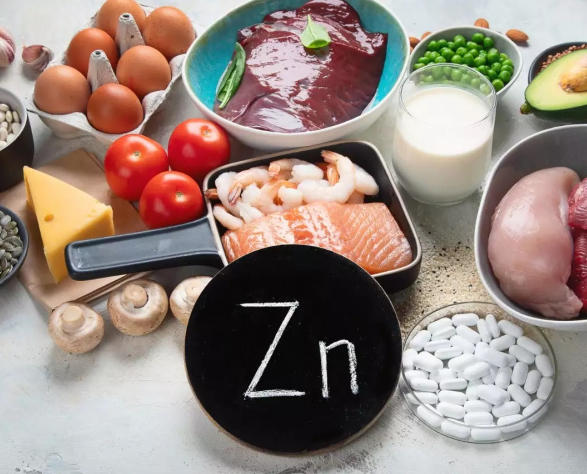
7. Zinc and Skin Health
In this section, we will discuss the role of zinc in wound healing, its impact on acne and dermatitis, and its anti-aging properties.
7.1. Wound Healing
Zinc plays a vital role in the wound healing process, as it is involved in various stages, including inflammation, proliferation, and remodeling. It is essential for the synthesis of collagen, a structural protein that provides strength and support to the skin, and the activation of metalloproteinases, enzymes that remodel the extracellular matrix during tissue repair. Zinc also possesses antioxidant and anti-inflammatory properties that can help reduce oxidative stress and inflammation in the wound environment. Additionally, zinc is necessary for the proper functioning of immune cells, which are involved in defending against infections and promoting wound healing.
7.2. Acne and Dermatitis
Zinc has been found to be beneficial in the treatment and prevention of various skin conditions, such as acne and dermatitis. It exhibits antimicrobial activity against the bacteria Propionibacterium acnes, which is associated with the development of acne, and it can reduce inflammation and sebum production in the skin. Zinc is also effective in alleviating the symptoms of dermatitis, including itching, redness, and scaling, due to its anti-inflammatory and skin barrier-strengthening properties.
7.3. Anti-Aging Properties
Zinc has been suggested to possess anti-aging properties, as it can protect skin cells from damage caused by oxidative stress and inflammation. It is involved in the synthesis and stabilization of various skin proteins, such as collagen and elastin, which are essential for maintaining skin elasticity and firmness. Zinc can also regulate the activity of metalloproteinases, which are involved in the degradation of the extracellular matrix during skin aging. By preserving the integrity of the skin’s structural components and preventing oxidative damage, zinc may help maintain a youthful and healthy appearance.
8. Zinc Deficiency and Toxicity
In this section, we will discuss the symptoms and causes of zinc deficiency, the risks and symptoms of zinc toxicity, and the importance of maintaining zinc balance.
8.1. Symptoms and Causes of Zinc Deficiency
Zinc deficiency can result from inadequate dietary intake, malabsorption, or increased bodily losses of zinc. Symptoms of zinc deficiency can vary and may include growth retardation, delayed wound healing, immune dysfunction, skin disorders (such as acne, dermatitis, and dry skin), hair loss, taste and smell disturbances, night blindness, and cognitive impairments. Certain populations, such as pregnant and lactating women, infants, and elderly individuals, are at a higher risk of developing zinc deficiency due to increased physiological demands or reduced absorption.
8.2. Zinc Toxicity: Risks and Symptoms
Zinc toxicity is relatively rare but can occur due to excessive supplementation, occupational exposure, or contamination of food and water. Symptoms of zinc toxicity may include nausea, vomiting, diarrhea, abdominal pain, headache, dizziness, and in severe cases, seizures, and organ damage. Chronic excessive zinc intake can also interfere with the absorption of other essential nutrients, such as copper and iron, leading to imbalances and related health issues.
8.3. Maintaining Zinc Balance
Achieving a proper balance of zinc is crucial for maintaining overall health and preventing both deficiency and toxicity. The best approach to ensuring adequate zinc intake is through a balanced diet rich in zinc-containing foods. If supplementation is necessary, it is essential to consult a healthcare professional for guidance on the appropriate dosage and duration. Monitoring zinc levels and adjusting intake as needed can help maintain zinc homeostasis and support optimal health.
9. Therapeutic Applications of Zinc
In this section, we will discuss the potential therapeutic applications of zinc, including its use in the treatment of common colds, age-related macular degeneration, and mental health disorders.
9.1. Zinc and the Common Cold
Zinc has been studied for its potential role in the prevention and treatment of the common cold. Research suggests that zinc may help reduce the duration and severity of cold symptoms when taken within 24 hours of symptom onset. Zinc lozenges, in particular, are believed to work by inhibiting viral replication in the throat and upper respiratory tract. However, the optimal dosage, formulation, and duration of zinc supplementation for cold treatment remain unclear, and further research is needed to establish definitive recommendations.
9.2. Age-Related Macular Degeneration
Age-related macular degeneration (AMD) is a leading cause of vision loss in older adults. Some studies have suggested that zinc supplementation, in combination with other antioxidants, may help slow the progression of AMD and reduce the risk of vision loss. The Age-Related Eye Disease Study (AREDS) found that a specific formulation containing zinc, along with vitamins C and E, beta-carotene, and copper, could reduce the risk of AMD progression by approximately 25%. However, it is essential to consult a healthcare professional before starting any supplementation regimen for AMD, as individual needs may vary.
9.3. Zinc and Mental Health
Zinc has been implicated in various aspects of mental health, including mood regulation, cognitive function, and stress response. Some studies have suggested that zinc supplementation may be beneficial for individuals with depression, attention deficit hyperactivity disorder (ADHD), and other mental health disorders, particularly when zinc deficiency is present. Zinc is thought to modulate neurotransmitter systems, such as glutamate and GABA, and influence neuroplasticity, which may underlie its potential therapeutic effects. However, more research is needed to determine the optimal dosage and duration of zinc supplementation for mental health benefits and to establish its efficacy as an adjunct to conventional treatments.


